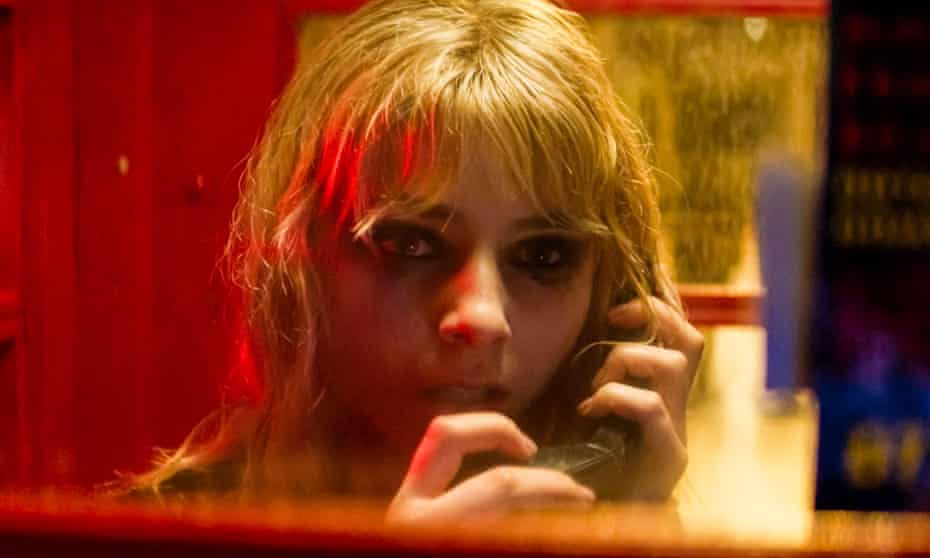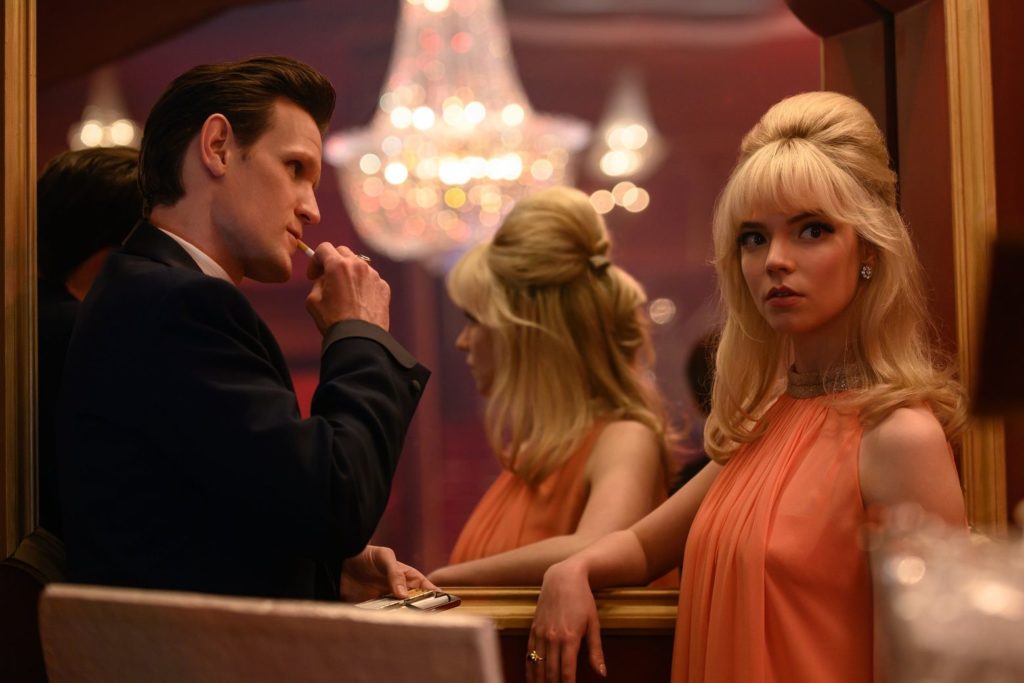Edgar Wright’s Giallo homage wants to say something about feminism but is too frothy and oversimplified.
Has any other director in recent years had as frustrating a creative decline as Edgar Wright? Discounting his feature debut—the 1995, no-budget A Fistful of Fingers—his streak was white-hot. Two series of Spaced both developed and prefaced his earnest eye for nerd culture, leading up to what would become his Cornetto Trilogy. His work was so loving, so finely tuned, and, especially in the case of Scott Pilgrim vs. the World, some of the most pop-culturally keen around. However, Baby Driver couldn’t help but sit in neutral; it was a pet project missing heart. With that out of the way, perhaps there was something more substantial to come next.
That appears to be the case at first. Wright’s latest, Last Night in Soho, has the markings of some of his stronger work. In some ways, it even signals growth for the filmmaker. The staging—bolstered by Park Chan-wook’s regular DP, Chung Chung-hoon—is dreamier. The editing, again from Paul Machliss, focuses more on threading visual and aural needles than landing punch lines. The lighting comes to form its own lullabies; the soundtrack supports what’s onscreen, unlike Wright’s previous film. The humor is just as droll but not as front and center, and the main characters are thematically predicated on their respective semiotics, to varying degrees of success.
The protagonist is Eloise (Thomasin McKenzie). She’s fresh-faced and obsessed with the ‘60s, an aspiring fashion designer finally setting foot outside of rural England. Now, she’s headed to London for college and, soon after, meets her comically crude roommate, Jocasta (Synnøve Karlsen). Not one for the partying or politics of arrested development, Eloise finds a new flat hosted by one Ms. Collins (Diana Rigg, in her final role). As she heads under the covers at night and the neon of the city lays her down, Eloise has recurring dreams. They’re hypnotic, too. Alas, Last Night in Soho thinks that just isn’t enough.
The dreams themselves follow Sandie (Anya Taylor-Joy), a young woman from 50 years ago with her own goals. She wants to be a singer, spending her time perusing London’s nightlife. There, she quickly makes the acquaintance of Jack (Matt Smith), whose behavior soon becomes possessive. Be they dreams, supernatural visions, or something in the middle, they provide Eloise with inspiration for her own work. They also give her a high to chase, leading her to follow Sandie’s story until her fate reveals itself.

In many ways, it’s a suitably frothy way for Wright to exercise his predilection for pastiche. The script, which he and Krysty Wilson-Cairns wrote, is capable in its ability to drip information to audiences amongst the bombast. Granted, the technical prowess is the reason Last Night in Soho works at all. The efforts of Machliss, and especially Chung, lift the movie up for the most part, and their work complements one another’s in pacing and visuals. While the film lacks its own aesthetic definitions between reality and dreams, it accrues its own signifiers—ticks, cuts, framing—almost on a subconscious basis.
Through all the strobe effects and sound work, Last Night in Soho reaches a frequency that’s too circuitous to avoid falling into. There are textural anachronisms that come with the period shifts, yes, but they actually work to the film’s advantage. More so, the performances bridge the gaps. McKenzie helps realize Eloise’s meeker tendencies where the script doesn’t. Taylor-Joy, conversely, leans into the writing’s sense of artifice. She focuses on fleshing out a symbol instead of a person because, by the end of the day, that’s who Sandie is.
Of course, that’s intentional—at least up to a point. For the first 85 minutes, Last Night in Soho works so well because it mostly knows its thematic limits. The story is so on the backburner that it seems to be a non-issue as a whole. When approaching it as a vessel for something much more fun, it works. The problem is that Wright and Wilson-Cairns don’t make that their focus, and it’s once story becomes paramount in the last quarter that the film suddenly derails into something as misguided as it is out of place.

As Sandie begins to haunt Eloise, so does her world. So does her history, namely her history of exploitation by the men around her. Suddenly, Wright and company are of the belief that they have the capacity to make a girl power statement. Alas, in its own execution, the picture’s attempts at lending a feminist bent reduce and oversimplify the topics and women it tries to explore. And yet, is it really trying to explore these themes? It can be quite hard to tell.
If it is, then it fails on that front. Sketching Sandie as an object of nostalgic and sexual fetishism to Eloise (and many of the film’s male characters) makes sense for a while. It’s how the movie establishes a status quo in order to comment on it. That said, Last Night in Soho does nothing to subvert that in a capacity aside from a messy plot twist. It, within less than 30 minutes left, tries to take a stand against legal authority’s prejudice against women. It also tries to coalesce its mythology into a metaphor for generational trauma. There are some references to mental illness early on, too, but as to the point of those? There aren’t really any.
It’s as if Wright and Wilson-Cairns felt an obligation to write a screenplay that’s “about” something without examining if they had the bandwidth to do so. The final product isn’t offensive; it’s too naive for that. Truthfully, it’s as socially naive as Eloise herself is at the beginning. The movie as is it stands in desperate need of a few rewrites to fulfill its potential. What starts off as light and mesmerizing in equal measure ends up unable to balance pastiche with its own themes. In that way, Last Night in Soho kind of plays like an encapsulation of Wright’s filmography thus far. Hopefully, he’ll get back on track soon.
Last Night in Soho is now playing in theaters
Last Night in Soho Trailer:
Read next: The Spool's Best New Releases
Streaming guides
The Best Live TV Streaming Services With Free Trial
The praises of live TV streaming services don’t need to be further sung. By now, we all know that compared to clunky, commitment-heavy cable, live TV is cheaper and much easier to manage. But just in case you’re still on the fence about jumping over to the other side, or if you’re just unhappy with ... The Best Live TV Streaming Services With Free Trial
How to Watch Power Book III: Raising Kanan Season 3
Season 3 of the hotly anticipated Power spin-off, Power Book III: Raising Kanan, is arriving on Starz soon, so you know what that means: it’s the ’90s again in The Southside, and we’re back with the Thomas family as they navigate the ins and outs of the criminal underworld they’re helping build. Mekai Curtis is ... How to Watch Power Book III: Raising Kanan Season 3
How to Watch Doctor Who: 60th Anniversary Specials
Ladies and gentlemen, we’re so back! To celebrate Doctor Who’s 60th anniversary, the BBC is producing a three-episode special starring none other than the Tenth/Fourteenth Doctor himself, David Tennant. And to the supreme delight of fans (that would be me, dear reader), the Doctor will be joined by old-time companion Donna Noble (Catherine Tate) and ... How to Watch Doctor Who: 60th Anniversary Specials
Which Netflix Country has Interstellar?
Maybe you’ve just seen Oppenheimer and have the strongest urge to marathon—or more fun yet, rank!—all of Christopher Nolan’s films. Or maybe you’re one of the few who haven’t seen Interstellar yet. If you are, then you should change that immediately; the dystopian epic is one of Nolan’s best, and with that incredible twist in ... Which Netflix Country has Interstellar?
Which Netflix Country Has Each Movie of The Hunger Games?
For whatever reason, The Hunger Games series isn’t available in the same countries around the world. You’ll find the first and second (aka the best) installments in Hong Kong, for instance, but not the third and fourth. It’s a frustrating dilemma, especially if you don’t even have a single entry in your region, which is ... Which Netflix Country Has Each Movie of The Hunger Games?
How to Watch ESPN With A Free Trial
One of the major concerns people have before cutting the cord is potentially losing access to live sports. But the great thing about live TV streaming services is that you never lose that access. Minus the contracts and complications of cable, these streaming services connect you to a host of live channels, including ESPN. So ... How to Watch ESPN With A Free Trial
How to Watch Paramount Network With a Free Trial
To date, Paramount Network has only two original shows on air right now: Yellowstone and Bar Rescue. The network seems to have its hands full with on-demand streaming service Paramount+, which is constantly stacked with a fresh supply of new shows. But Yellowstone and Bar Rescue are so sturdy and expansive that the network doesn’t ... How to Watch Paramount Network With a Free Trial
How to Watch WE TV With a Free Trial
Previously “Women’s Entertainment,” We TV has since rebranded to accurately reflect its name and be a more inclusive lifestyle channel. It’s home to addictive reality gems like Bold and Bougie, Bridezillas, Marriage Boot Camp, and The Untold Stories of Hip Hop. And when it’s not airing original titles, it has on syndicated shows like 9-1-1, ... How to Watch WE TV With a Free Trial
How to Watch Comedy Central With a Free Trial
It’s no coincidence that many of today’s biggest comedians found their footing on Comedy Central: the channel is a bastion of emerging comic talents. It served as a playground for people like Nathan Fielder (Fielder For You), Ilana Glazer and Abbi Jacobson (Broad City), Tim Robinson (Detroiters), and Dave Chappelle (Chappelle’s Show) before they shot ... How to Watch Comedy Central With a Free Trial
How to Watch FX With a Free Trial
You’d be hard-pressed to find a bad show airing on FX. The channel has made a name for itself as a bastion of high-brow TV, along with HBO and AMC. It’s produced shows like Atlanta, Fargo, The Americans, Archer, and more recently, Shogun. But because it’s owned by Disney, it still airs several blockbusters in ... How to Watch FX With a Free Trial
How to Watch TNT Sports With A Free Trial
For many sports fans, TNT is a non-negotiable. It broadcasts NBA, MLB, NHL, college basketball, and All Elite Wrestling matches. And, as a bonus, it also has reruns of shows like Supernatural, Charmed, and NCIS, as well as films like The Avengers, Dune, and Justice League. But while TNT used to be a cable staple, ... How to Watch TNT Sports With A Free Trial